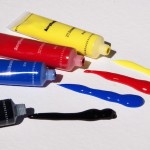Prepositions after adjectives

There’s no easy way to know which preposition follows an adjective. The best way to learn this grammar is to learn the adjective and preposition together. If there’s a verb after the preposition, it must of course be in the gerund form. Here is a list of the most common adjective + preposition combinations:
absent from: She’s been absent from class for a week.
afraid of: She says she’s not afraid of anything.
angry with (at) / about: She’s angry with (at) her sister. (both with and at are correct before a person or animal)
He’s angry about the weather. (use about before a thing)
ashamed of (someone) for / about: I’m ashamed of myself for lying to my mother. (for is used before a reason)
They’re both ashamed about their behavior.
aware of: I wasn’t aware of any problems they were having.
bad at: He’s bad at remembering names.
based on: The movie is based on a real-life story.
bored with: They stopped playing because they were bored with the game.
capable of: I don’t think he’s capable of murder.
certain of: I left my wallet right here. I’m certain of it.
clever at: She’s quite clever at solving puzzles.
close to: We all live close to our parent’s house.
compared to (with): Compared to (with) yesterday it’s much warmer. (no difference between to and with)
concerned about: They’re concerned about their son joining the army.
content with: I’m content with my apartment and don’t want to move.
different from: This tea tastes different from the tea we had yesterday.
disappointed in (with): His father was disappointed in (with) him. (no difference between in and with)
done with: Could you pass the salt when you’re done with it
dressed in: Everyone was dressed in black for the funeral.
embarrassed about: I’m embarrassed about the way I acted last night.
engaged to: She just got engaged to a wonderful man.
equal to: Your success will be equal to the amount of work you do.
equipped with: This car is equipped with GPS. (Global Positioning System)
excited about: Everyone is excited about the arrival of the Queen.
familiar with: I’m not familiar with that language.
famous for: Thomas Edison is most famous for the invention of the light bulb.
far from: The place we’re going is far from here.
fond of: My girlfriend is very fond of chocolates.
free of: This food is free of artificial colors and flavors.
friendly to (with): It’s important to be friendly to (with) your coworkers. (no difference between to and with)
frightened of / about / by: She seems to be frightened of the dog. (use of before an ongoing source)
She’s frightened about losing her home. (use about before a situation)
She was frightened by the loud noise. (use by before a single source)
furious at (someone) for / about: She’s furious at him for staying out so late. (use at before a person or animal)
They’re furious about the decrease in their pensions. (use about before a thing)
glad about: I’m glad about your acceptance to university.
good at / with: He’s good at sports. (use at before activities)
He’s good with his hands. (use with before tools)
grateful (to someone) for: We’re grateful to you for lending us the money.
We’re grateful for all we have. (to someone can be dropped)
guilty of: I’m not guilty of this crime.
happy about (with): They’re not happy about (with) all the delays. (no difference between about and with)
inferior to: This cell phone is inferior to the iPhone.
innocent of: I believe you’re innocent of the charges.
interested in: He’s been interested in flying for as long as I’ve known him.
involved in: I don’t want to get involved in your business.
jealous of: He’s jealous of his ex-girlfriend’s new boyfriend.
known for: This restaurant is known for its cheesecake.
lucky at: I’ve never seen someone so lucky at poker.
made of / from / by / for: This table is made of reclaimed wood. (use of for the material)
This table is made from the wood of an old ship. (use from for the origin)
This table is made by Uhuru, a company in New York City. (use by for the maker)
This table is made for people who love wood furniture. (use for for the destination)
married to: They’ve been married to each other for twenty years.
necessary (for someone) to: It’s not necessary for you to help clean up.
It’s not necessary to clean up tonight. (for someone can be dropped)
nervous about: I’m nervous about my first day on the job.
next to: He put his keys next to his wallet.
opposite of: The opposite of love is indifference, not hate.
patient with: She’s always very patient with her students.
perfect for: Those earrings are perfect for my wife.
polite to: They’ve taught their children to always be polite to other people.
possible (for someone) to: Is it possible for people to live on Mars?
Is it possible to live on Mars? (for someone can be dropped)
proud of (someone) for / to: She’s proud of her daughter for telling the truth.
She’s proud to represent her company at the conference.
related to: Are you related to Mark Zuckerberg, the founder of Facebook?
responsible for: Because of his mental illness, he was not responsible for his actions.
satisfied with: I feel satisfied with my job.
scared of: Don’t be scared of trying something new.
shy about: He’s shy about speaking in public.
sick of / with: I’m sick of watching TV all the time. Let’s go out. (sick of means tired of)
I think she’s sick with the flu. (sick with means physically sick)
slow at: He’s a little slow at math, but he can usually get the right answer.
sorry for (about): I’m sorry for the way I acted yesterday. (no difference between for and about)
superior to: These speakers are superior to the ones in the other store.
sure of (about): Are you sure of your answer? (no difference between of and about)
surprised at (someone) for / by: I’m not at all surprised at him for making that decision. (use at before a person or animal)
I’m not at all surprised by his decision. (use by before a thing)
terrified of: My sister is terrified of spiders
tired of / from: Aren’t you tired of spending your whole day inside? (tired of means you don’t want to do it anymore)
Aren’t you tired from all the activity during the holidays? (tired from means physically tired)
typical of (for)(someone) to: It’s typical of her to be late. (no difference between of and for)
upset with (at) (someone) for / about: I’m upset with (at) him for breaking the vase. (no difference between with and at)
I’m upset about the change in government.
worried about: Are you worried about the weather on your wedding day?
wrong with: There’s nothing wrong with putting yourself first.
Your Score:
Your Ranking:
Your Score:
Your Ranking:
Your Score:
Your Ranking:
© 2013 Ambien Malecot








